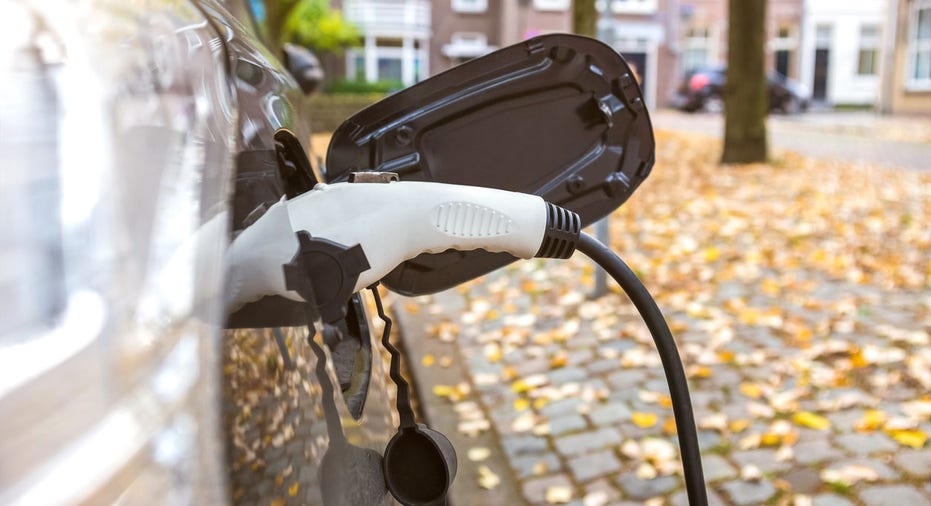Build Back Better expands EV tax credit with $12.5K incentive on American-made electric cars
Here's what to know about buying and insuring plug-in hybrid vehicles

The Biden administration's trillion-dollar spending plan offers enhanced rebates for EV buyers who purchase a car through a domestic automaker. (iStock)
President Biden's Build Back Better spending plan is the "largest effort to combat climate change in American history," according to the White House. One significant part of that investment is to expand access to electric vehicles.
The Build Back Better Act includes a new electric vehicle tax credit of up to $12,500 for drivers who buy an American-made electric car, which can make these vehicles more affordable for middle-class families who have been priced out of the EV market.
The House of Representatives passed Build Back Better with a party-line vote on Nov. 19. However, the $1.75 trillion spending plan now hinges on Senate approval. Republicans and moderate Democrats like Sen. Joe Manchin (D-W.Va.) have been hesitant to back the bill, raising concerns about adding to the federal deficit.
Keep reading to learn more about how Build Back Better's tax credits can reduce the sticker price of electric vehicles, as well as how to insure an electric car. You can compare car insurance rates for free on Credible's online marketplace.
HOUSE PASSES BUILD BACK BETTER SPENDING PLAN, HERE'S HOW IT MAY IMPACT YOUR FINANCES
Build Back Better includes tax incentives for electric vehicles
The Internal Revenue Service (IRS) currently offers federal tax credits ranging from $2,500 to $7,500 for electric cars under the Qualified Plug-In Electric Drive Motor Vehicle Credit.
The Build Back Better framework increases the credit amount to a total of $12,500 for electric vehicles that are assembled domestically with American materials and union labor. With these restrictions, only cars made by American manufacturers like General Motors (GM), Ford and Stellantis would qualify.
Notably, vehicles from the popular American EV manufacturer Tesla would not qualify for this credit. That's because the incentive from the IRS is only available for the first 200,000 vehicles sold by an automaker — and Tesla reached that threshold in 2018, Reuters reported.
Under the bill, the expanded tax credit is available to taxpayers with an adjusted gross income cap of up to $250,000 for individuals and $500,000 for joint filers. The EV credit is also limited to cars priced at no more than $55,000 and vans, SUVs or pickup trucks up to $80,000.
This may pose a problem for some prospective buyers, as the average price of an electric vehicle was $55,676 in October 2021, according to Kelley Blue Book (KBB) data.
Compared with the current EV tax credit, the Build Back Better proposal makes it easier for buyers to claim the tax credit. The bill allows dealers to collect the $7,500 on the customer's behalf, which effectively reduces the sticker price upfront.
Build Back Better also includes significant investments in electric vehicle infrastructure to increase EV charger installation, making electric cars more alluring to drivers who commute long distances.
If you're considering taking advantage of the enhanced EV incentives, make sure to protect your investment with a comprehensive auto insurance policy. You can learn more about auto insurance and compare quotes on Credible's online marketplace.
DOES IT COST MORE TO INSURE AN ELECTRIC CAR?
What you should know about auto insurance for electric cars
Insuring an electric vehicle can be slightly different than insuring a gas-powered vehicle.
Some auto insurance companies offer discounts to drivers who buy eco-friendly vehicles, according to Young Alfred. In fact, some auto insurers believe that consumers who drive electric vehicles are more likely to be responsible drivers, resulting in lower rates.
But since electric vehicles tend to be more expensive, that can also make them more costly to insure. The average transaction price of an electric vehicle is nearly $10,000 higher than the price across all vehicles, KBB data shows.
Car insurance companies also set premiums based on:
- Driving history
- Vehicle make and model
- Annual mileage
- ZIP code
- Marital status
When shopping for auto insurance coverage, it's important to compare rates across multiple insurers. Doing so may save you hundreds of dollars per year on your premiums. Visit Credible for free car insurance quotes, so you can rest assured that you're getting the lowest possible rate on your policy.
SAVE MONEY WHEN BUYING A CAR WITH THESE 3 TIPS, ACCORDING TO STUDY
Have a finance-related question, but don't know who to ask? Email The Credible Money Expert at moneyexpert@credible.com and your question might be answered by Credible in our Money Expert column.




















